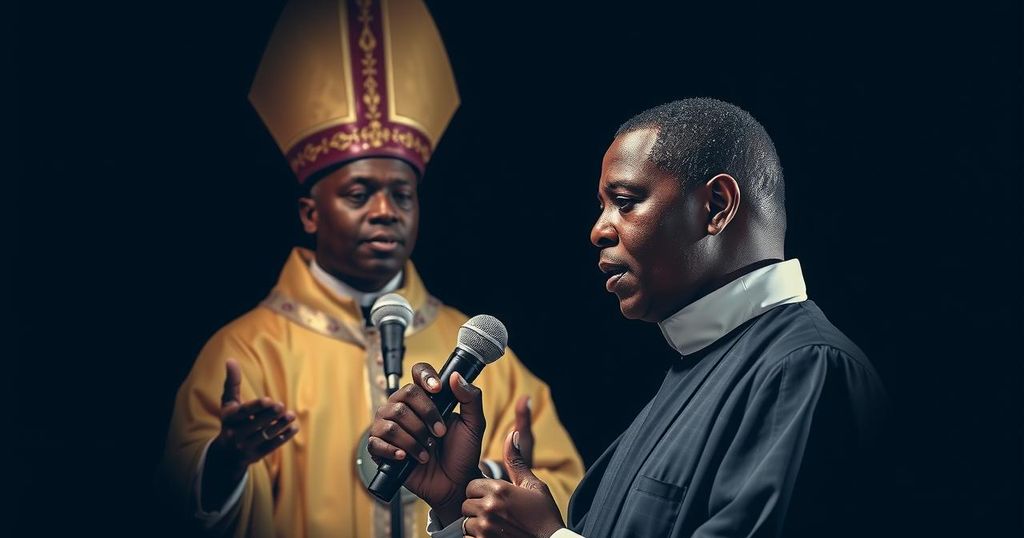Monsignor Donatien Nshole of the DRC’s Catholic Church warns against constitutional changes proposed by President Tshisekedi to extend his term. He advocates for socio-economic recovery over political amendments, expressing concerns over national cohesion, and calls for a general mobilization against these reforms.
In the Democratic Republic of the Congo (DRC), Monsignor Donatien Nshole, the secretary general of the National Episcopal Conference of Congo (CENCO), has called for a general mobilization against proposed constitutional amendments aimed at extending presidential term limits. He characterizes these changes as a perilous undertaking that could jeopardize national solidarity and detract from pressing socio-economic recovery efforts. Emphasizing the necessity of addressing the dire socio-economic conditions over constitutional revisions, he stated, “If we are not heard, each party will bear responsibility for the consequences, which we cannot predict.” This statement signifies the Catholic Church’s intention to support rather than oppose governmental leadership for the benefit of the populace. President Félix Tshisekedi has proposed amendments to the constitution he deems outdated, which could potentially modify term limits. However, this initiative has prompted considerable concern, given that the current constitution, established in 2006, prohibits alterations to presidential term limits. This existing framework was previously undermined under former President Joseph Kabila, who extended his stay through compulsive measures. Critically, Tshisekedi’s previous criticism of Kabila for constitutional violations has raised doubts regarding his current position on similar reforms. Amidst this political unrest, Msgr. Nshole urges that constitutional changes could further escalate tensions in a nation already grappling with security issues. He advocates for prioritization of socio-economic advancements rather than diverting essential resources to politically motivated referendums. Emphasizing responsible governance, he remarked, “The Constitution has helped establish security and stability in the country. The DRC’s current challenges are not so much about the constitutional text but its implementation.” CENCO’s efforts encompass encouraging dialogue among key stakeholders to foster a collective approach to tackling the nation’s core challenges, particularly regarding security. The Catholic Church remains committed to ensuring that the government is held accountable and serves the interests of the citizens. As political tensions rise in response to these proposed constitutional changes, the DRC stands at a critical juncture. With social unrest and widespread strikes exacerbating the nation’s fragile state, the church’s mobilization efforts reflect a broader call for stability and attentiveness to the dire needs of the populace.
The Democratic Republic of the Congo is currently navigating a complex political situation where proposed amendments to the Constitution threaten to extend presidential term limits. This proposal has elicited strong opposition from religious leaders, particularly from the Catholic Church, which emphasizes the need for stability and socio-economic recovery over political maneuvering. The historical context, dating back to the Kabila presidency, highlights a recurring theme of constitutional violations that detracted from national well-being. The involvement of CENCO emphasizes the church’s role in advocating for responsible governance and prioritizing the needs of the population over political expedience.
In summary, the proposed constitutional amendments by President Félix Tshisekedi have sparked significant opposition from the Catholic Church, which views such changes as potentially destabilizing for the DRC. Monsignor Nshole advocates for prioritizing socio-economic improvements over political reforms, stressing the importance of a cohesive national approach to governance. The call for general mobilization reflects a broader concern for the well-being of the Congolese people amidst increasing political and social unrest.
Original Source: international.la-croix.com






